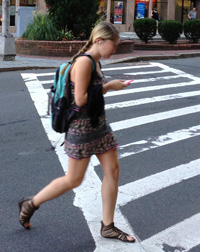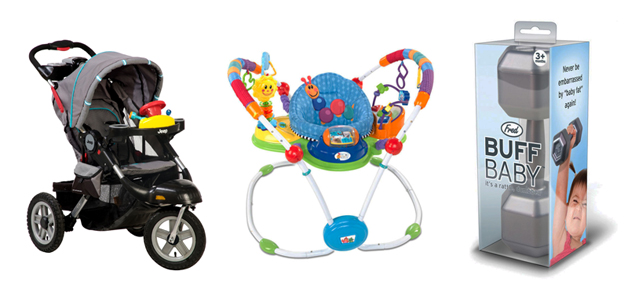Posts Tagged ‘attorney’
Put Down the Cell Phone, No Walking While Distracted!
 Do you talk on your cell phone or read e-mails while walking? Many of us do. This practice – often called walking while distracted – can cause serious injuries to you and others around you.
Do you talk on your cell phone or read e-mails while walking? Many of us do. This practice – often called walking while distracted – can cause serious injuries to you and others around you.
There is good reason to think about pedestrian safety. After years of decreases, overall pedestrian traffic deaths have been on the rise in the U.S. In 2011, 4,432 pedestrians were killed in motor vehicle accidents, an 8 percent increase from 2009, according to the National Highway Traffic Safety Administration (NHTSA).
That same year, 1,152 people were treated in hospital emergency rooms for injuries from walking and using a cell phone or electronic device, according to the Consumer Product Safety Commission (CPSC).
Boston-based Liberty Mutual Insurance Company recently published a Pedestrian Safety Survey of over 1,000 adults. It reported 55 percent of respondents consider texting or e-mailing while crossing the street to be the most dangerous activity while walking.
This was even more than those who feel running across a street to beat oncoming traffic was most dangerous! Still, 60 percent of pedestrians reported texting, e-mailing or engaging in other behaviors while they walked, even though 70 percent considered the behavior dangerous.
Young people account for many of the distracted walkers. Safe Kids Worldwide, a non-profit organization, recently reported that it observed 34,000 children crossing the street near U.S. schools. One in five high school students and one in eight middle school students was distracted by a cell phone or electronic device.
A few tips for staying safe:
Put your cell phone away. Whenever you walk in a public area, put your phone in a bag or your briefcase. This includes supermarket parking lots, walking down the street on a sidewalk or waiting out at the bus stop with your child.
Don’t let the music distract you! Keep the volume low enough to hear traffic and other sounds around you. Do not adjust settings when crossing the street.
Step aside. It is best not to use your cell phone at all. But if you do, step away from the street and other pedestrians.
Crosswalks. Cars should stop at crosswalks for pedestrians, but do not take this for granted. Try and make eye contact with drivers before crossing the street and never pull out your cell phone while standing and waiting to use a crosswalk.
Never use a cell phone while crossing the street. This may sound obvious: Do not step into the street while you are reading or entering data or talking on your cell phone.
Watch out for bicycles. Cyclists can pass traffic on the right hand side and may be moving alongside traffic that has stopped. Be careful when stepping into the street.
Watch for other pedestrians. Realize that other people are probably going to be walking while using their cell phone and you have to anticipate them.
Related:
Put that phone down and just walk, The Boston Globe. Read More
Child Passenger Safety Week September 15-21

Many parents follow the law and fasten their children into child passenger safety seats. But the National Highway Traffic Safety Administration (NHTSA) says three out of four are doing it incorrectly, leaving children vulnerable to serious injuries.
There is a lot of confusion about child passenger safety seats. They are challenging for parents to position and laws change every few years. Additionally, each state has its own law. But they are important. Child safety seats reduce the risk of death for infants by 71 percent, according to the Centers for Disease Control and Prevention (CDC). The figure is 54 percent for toddlers ages 1 to 4.
September is a good time for parents to have their child’s passenger safety seat inspected for free. The NHTSA and communities across the country will hold Child Passenger Safety Week is Sept. 15 – 21. Sept. 21 is National Seat Check Saturday. You can search this database or this website to find a child seat inspection station near you (we suggest you call in advance to check).
There are inspection stations in Boston, Cambridge, Somerville and many other Massachusetts communities. These technicians should be certified and trained in the NHTSA curriculum. Some stations, such as local police departments, are often available to help parents throughout the year if you call for an appointment.
Massachusetts Child Passenger Safety Law
The Massachusetts Child Passenger Safety Law requires all children to use child passenger restraints until they are 8 years old or over 57 inches tall (4′ 9″). Up until 2008, the law only required children under 5 years of age and 40 lbs to ride in a safety seat.
There are four types of car seats: infant carrier seats, rear-facing convertible seats, forward-facing seats and booster seats, for children ages 4 until they are 8 years old in Massachusetts. When children turn 8 and are 57 inches tall, they can move into a seatbelt. The state recommends children travel in the backseat wearing a seatbelt until they are age 13.
Use of a booster seat reduces the risk of fatal injury for children ages 4 – 8 by 55 to 67 percent compared to unrestrained children and adults, according to a recent article in the University of Michigan Transportation Research Institute.
Another Change in Law May Be Coming
Another change may be coming for child passenger safety seats, but if so, the requirement will not be effective until February 2014.
The NHTSA has proposed that a child car seat be secured by a seat belt and top tether rather than the Latch system, according to the Wall Street Journal. In 2002, the Latch system became a federal requirement and new cars had to have anchor points between cushions so child safety seats could be secured.
The reason for the change is car seats were lighter a decade ago. Children were not required to use them for as many years as they are under today’s laws. The changes would include new labeling for car seats identifying the weight limits. The Juvenile Products Manufacturers Association represents child seat makers and is asking for the new requirement to be suspended and instead for the weight limits to be increased for the back seat anchors.
Related:
Norfolk Propane Gas Explosion Leads to Federal Safety Alert
As a direct result of our client’s tragic death, a leading federal agency has issued a safety alert regarding nationwide measures to prevent catastrophic propane gas explosions.
On July 17, 2013, the U.S. Department of Transportation’s Pipeline and Hazardous Materials Safety Administration (PHMSA) published a national safety alert in the Federal Register which warns the public of the risks associated with under-odorization of Liquefied Petroleum Gas (LPG). It also advises shippers and carriers on recommended procedures for ensuring that LPG is properly odorized on all modes of transportation.
The PHMSA called the Norfolk gas explosion which killed Nichols and injured seven others the “most notable” of cases it considered.
On July 30, 2010, William Nichols, a 47-year-old electrician was working in the basement of an unfinished condominium at The Village at River’s Edge when it exploded. The structure was demolished. Nichols was buried under burning debris for 70 minutes and suffered burns over 80 percent of his body before he was rescued. Emergency workers responded from 21 nearby cities and towns. He died later that night at a Boston hospital.
The Nichols family was represented by attorney Marc L. Breakstone, of Breakstone, White & Gluck of Boston. In the lawsuit, the Nichols’ family alleged that EnergyUSA had negligently under-filled a new propane tank in the condominium development, causing the chemical odor which had been added to the propane to fade and become undetectable. When a loose fitting on the plumbing caused odorless propane gas to leak into the basement, Nichols and others were unaware of the extreme danger of working in the structure. When a hot water heater pilot ignited, the house exploded in a ball of flames. The remaining structure caved in on Mr. Nichols who was trapped in burning debris for over an hour.
During the litigation, Breakstone discovered that the propane supply company had intentionally under-filled the storage tank to save around $2,000. As a result of this, the chemical odorant in the gas faded out making the leaking gas undetectable.
The family settled its wrongful death lawsuit with EnergyUSA Propane and Smolinsky Brothers Plumbing and Heating for $7.5 million.
New Recommendations
Injection process. LPG is odorized through manual and automated injection. When it is odorized by manual means, the PHMSA recommends quality control checks be conducted. It recommends periodic equipment checks when LPG is odorized through automated means.
New tanks or freshly cleaned tanks. The PHMSA recommends those who fill LPG tanks use quality control measures that ensure LPG has sufficient odorant when it is delivered to end users. It also recommends people who receive new or recently cleaned propane tanks be notified.
Odorization standards. PHMSA recommends that all LPG transported in rail tank car tanks or cylinders be odorized in accordance with the requirements of § 173.315(b)(1), of the Hazardous Materials Regulations, issued by the Department of Transportation.
Read the regulations here.
About Breakstone, White & Gluck
Breakstone White & Gluck has over 100 years of combined experience successfully representing the seriously injured. To learn more, visit our website at www.bwglaw.com.
Court Ruling on MedPay Coverage Favorable to Massachusetts Drivers
 The Supreme Judicial Court recently issued a ruling favorable to Massachusetts drivers on the subject of medical payments coverage in the standard Massachusetts automobile insurance policy.
The Supreme Judicial Court recently issued a ruling favorable to Massachusetts drivers on the subject of medical payments coverage in the standard Massachusetts automobile insurance policy.
Medical payment coverage, often called MedPay, is one of eight optional coverages which drivers can purchase on their auto insurance policy. All Massachusetts drivers are required to purchase compulsory coverage, which includes $8,000 in Personal Injury Protection (PIP) benefits. They can also purchase other optional coverage types, such as MedPay. This pays co-pays and deductibles not covered by PIP benefits and medical services not covered by your health insurance policy.
In Golchin vs. Liberty Mutual Insurance Company, SJC-11305, the plaintiff suffered serious personal injuries traveling as a passenger in her husband’s car. Her medical expenses exceeded $100,000.
The car was insured by Liberty Mutual and the policy had up to $25,000 in optional MedPay benefits. Golchin had a health insurance policy with Blue Cross Blue Shield, which paid her medical bills (expenses totaled $100,883, but Blue Cross actually paid $32,033). Blue Cross placed a lien in this amount on any award Golchin received from her car accident case.
Golchin submitted documentation of medical expenses to Liberty Mutual, seeking coverage under MedPay. The insurance company refused the payment, claiming it was not required since Blue Cross had already paid the bills. When she settled her personal injury case, Golchin had to pay Blue Cross $32,033 out of her award to satisfy the lien, even though she had MedPay coverage.
Golchin filed her lawsuit in Worcester Superior Court in September 2008, alleging a breach of contract, a breach of implied covenant of good faith and fair dealing, and a violation of G.L. c. 93A, § 2.
In its August 8, 2013 decision, the Supreme Judicial Court held that Liberty Mutual could not avoid the payment of the medical payments coverage, and that the standard Massachusetts auto insurance policy provided for payments to the insured even when the health insurance company had made the payment.
There was certainly no unjust enrichment of the plaintiff in this case; all she got is what she had already paid for, and the auto insurance payment will only replace some of what was paid to the health insurance company to satisfy its lien.
Did you know that health insurance companies can recover their payments from your bodily injury claim? Most clients are stunned when they realize that their health insurance company can demand repayment of the bills that they paid. So even if you have great health insurance, the company will claim a lien on any personal injury case you have, and has the right to get paid, even before you do, and even if the settlement amount is not enough to cover all of your damages. Some insurance companies will negotiate their liens; others are not so sympathetic. Medical payments coverage on an auto policy is a good way to insure against lien repayments, and the cost of the coverage is very low.
Do you have MedPay coverage?
Ask your auto insurance agent if you have MedPay coverage. To learn more, read: Understanding and Buying Massachusetts Car Accident Insurance.
Read More
Filmmaker Explores Painful Consequences of Texting While Driving
We want to share a story we heard on NPR this morning. Texting while driving remains one of the leading safety hazards on our roads today, despite years of public service announcements, educational campaigns and media stories of tragedy.
German filmmaker Werner Herzog has now released a new and less traditional public service announcement. In an in-depth 35-minute film, he speaks to victims, families, law enforcement and drivers who made the mistake. In one case, he shows the daughter of a victim reunited with the driver who killed her father. In another case, a woman who was seriously injured by a texting driver faced more than a million dollars in medical bills.
The film is called, “From One Second to the Next,” and can be viewed below. It is part of the AT&T “It Can Wait” campaign.
In the NPR interview, Herzog said: “The message is very, very simple. Don’t text and drive.”
https://www.youtube.com/watch?v=_BqFkRwdFZ0
Read More
Bicycle Helmet Vending Machines Coming to Boston
 Safety is about to get more convenient for Boston cyclists. The City of Boston is bringing bike helmet vending machines here later this month.
Safety is about to get more convenient for Boston cyclists. The City of Boston is bringing bike helmet vending machines here later this month.
Boston is the first U.S. city to offer this service and the goal is aimed largely at helping riders of the Hubway bike share program. The city, in partnership with Alta Bicycle Share, launched Hubway in 2011. Today, there are more than 1,000 rental bikes in Boston and also Cambridge, Somerville and Brookline.
The first bike helmet vending machine will open Aug. 26 at a ribbon-cutting ceremony outside the Boston Public Library in Copley Square. It will be attached to a Hubway bike station. Other vending machines will be installed in additional areas.
How Will It Work?
Cyclists will be able to purchase or rent the bike helmets. Cyclists can either buy a helmet or pay $2 to rent a helmet for up to 24 hours (pricing is still being finalized). After that, their credit card will be charged to buy the helmet for about $20 (pricing is still being finalized there too). When helmets are returned, they will be taken to a warehouse for inspection and cleaned before going back into the machines. The helmets were designed by HelmetHub, formed by a group of MIT students as a class project.
Next Step a Boston Bike Helmet Law?
Massachusetts only requires cyclists who are 16 years old or younger to wear bike helmets. But in many areas, they are encouraged for all riders as protection against head injury.
One study reported 80 percent of bike share riders in Boston are not wearing helmets. The study by Beth Israel Deaconess Medical Center researchers reported the same figure for Washington D.C. Riders who owned their own bikes wore helmets about half the time.
The City of Boston has worked to encourage bike helmet use by subsidizing helmets for $7.99 and making them available at stores throughout the city. City officials announced a few months ago that their long-term goal is to pass a bike helmet law for Boston, which would require cyclists of all ages to wear helmets in the city.
Our Bike Helmet Donations for Children
The Boston bicycle accident lawyers at Breakstone, White & Gluck have over 90 years combined experience representing injured cyclists. We are proud supporters of the Boston cycling community. In 2013, we donated 1,000 bike helmets to children through programs such as Mayor Menino’s Boston Bikes Roll It Forward, CYCLE Kids of Cambridge, the Somerville Kiwanis Club and Winter Hill Community School and the Dedham Bike Rodeo.
If you have been injured in a cycling accident, it is important to learn your rights. For a free legal consultation, contact us at 800-379-1244 or 617-723-7676 or use our contact form.
Toys Recalled in Summer 2013 Pose Choking Hazard, Injury Risks

If you have young children, you have probably logged a few hours watching them play this summer. This joy of parenthood comes with an important responsibility: to make sure their toys are safe.
In the United States, the Consumer Product Safety Commission (CPSC) regulates the toy industry. Toys for children 12 and under are required to pass third-party testing and certification, but each year, defective toys still make it to store shelves and cause serious injuries and deaths. In 2011, more than 260,000 children were treated for toy-related injuries in the hospital emergency room and 13 were killed, according to the CPSC.
If you are a parent, be vigilant. Start by inspecting your children’s toys every time they play. Check the age labeling. Make sure they are no small parts that pose a choking hazard. When in doubt, set the toy aside and have your children play with something else.
Another way to protect your children is to stay informed. You may not see every toy recall on the TV news, but can visit the CPSC website and social media sites for news on toy recalls. A few recalls from this summer include:
Baby Einstein Musical Motion Activity Jumpers
Kids II voluntarily recalled about 400,000 Baby Einstein Musical Motion Activity Jumpers earlier this month. Another 8,500 activity seats have been recalled in Canada. The toy is linked to 61 injuries.
The hazard is when infants reach out and play with one of the attached toys (the toy with the smiley face), it rebounds back.
Kids II received 100 incident reports, including the 61 injuries. Injuries included bruises, facial lacerations and a 7-month-old boy who sustained a lineal skull fracture. In one case, an adult suffered a chipped tooth.
Kids II, which is based in Atlanta, Georgia, is the product importer. The toy was manufactured in China prior to November 2011. Kids II will replace the defective part for consumers for free. Many models were sold at Target, Toys R Us and Amazon.com between May 2010 and May 2013. Recall notice.
Kolcraft Jeep Liberty Strollers Kolcraft recalled 96,000 strollers in the United States after 39 reports of defective wheels. The inner tube can rupture, causing the wheel rim to fracture and fly off as a projectile. The reports included 18 injuries, most of which occurred when an adult attempted to fill a tire with air. Children and adults reported suffering lacerations, abrasions and contusions.
The stroller was manufactured in China. Kolcraft Enterprises, Inc. of Chicago, Illinois was the product importer. It was sold at Burlington Coat Factory, Sears and Toys R Us and other retailers from June 2010 to June 2013 for between $150 and $180.
Consumers are advised to stop using the defective stroller and contact Kolcraft for free replacement wheels. Recall notice.
“Buff Baby” Baby Rattles
In June, Fred & Friends announced the voluntary recall of 47,500 “Buff Baby” baby rattles in the United States. The rattles, which are designed to look like a dumbbell weight, are designed for children 3 months and older. The rattles were recalled because they pose a choking hazard to young users. The cap can separate and expose the plastic pellets inside to infants. Fred & Friends received two reports of this happening, but no injuries.
The rattles were sold in specialty toy and baby stores nationwide and in Canada, as well as online through Amazon.com and other websites from October 2011 through June 2013.
Consumers are advised to stop using the rattles and contact Fred & Friends for a full refund. Fred & Friends, which is located in Cumberland, Rhode Island, is the distributor. The toy was manufactured in China. Recall notice.
Thermobaby Bath Seats Recalled Due to Drowning Hazard
The Aquababy Bath Ring was recalled after the CPSC determined it does not meet federal safety standards. The product is supposed to hold children secure in the bath, but the design poses a risk for tipping over.
SCS Direct Inc. of Milford, Conn. voluntarily recalled 7,500 of the bath seats. There were no injuries involved in this recall. The seats were designed for children five months to ten months old. It was sold through Amazon.com. Consumers are advised to stop using the product and contact SCS Direct for a $35 refund. Recall notice.
Read More
Amusement Park Accidents are Investigated Differently in Massachusetts and Texas

Student Athlete Concussions Not Being Reported by Massachusetts High Schools

Only 31 percent of Massachusetts high schools and middle schools complied last year with a state law mandating reporting on student athlete concussions. State officials are hoping for greater compliance when new figures come due August 31.
In 2010, Massachusetts passed a law aimed at identifying and preventing concussions among student athletes. Under the law, 689 public and private schools were required to report data for the 2011-2012 academic year. However, only 213 schools submitted figures, and those figures showed that 3,450 students had suffered a head injury or suspected concussion in sports. The figures were recently reported in The Boston Globe.
To encourage reporting this year, the state has changed its form to make deadlines appear more prominent and provide definitions for data.
Massachusetts Law
A concussion is a mild traumatic brain injury caused by a force to the head, such as a fall or car accident. Symptoms typically include headaches, dizziness and memory problems. Left untreated, it can result in long-term brain impairment. In recent years, focus has been on preventing concussions in sports at every level, from the National Football League (NFL) to high schools down to Pop Warner football leagues.
Massachusetts is one of 47 states which have passed so-called “return to play” laws since 2009. The state of Washington passed the first concussion in sports law in 2009.
The Massachusetts sports concussion law requires students, parents and coaches to receive annual training to recognize the signs of a concussion. Students who sustain a concussion are required to sit out and obtain a doctor’s written permission to return to the game.
As a final step, schools must report figures to the Massachusetts Department of Public Health (DPH). Public schools and those subject to the rules of the Massachusetts Interscholastic Athletic Association (MIAA) must comply with the law.
Sports and recreational activities cause 3.8 million concussions each year in the United States, according to the Centers for Disease Control and Prevention (CDC). When an athlete suffers a concussion, they become at risk for suffering another one. Proper rest is important, and teenagers, along with older adults and young children, are believed to have longer recovery periods.
If you are the parent of a student athlete, summer is a good time to learn about the law. Ask your child’s coach when the school will hold concussion training sessions. You can also read a summary of the Massachusetts sports concussion law.
Related:
State revises concussion reporting after weak response from schools, The Boston Globe.
Product Liability: Retailer Fined $3.9 Million for Illegal Sale of Children’s Clothing with Drawstrings
Last month, a discount retailer agreed to pay one of the largest fines ever issued by the Consumer Product Safety Commission (CPSC). The civil penalty settles allegations over illegal sales of children’s clothing with drawstrings.
The CPSC announced that Ross Stores, based in Pleasanton, California, agreed to pay a $3.9 million penalty and implement compliance programs. From January 2009 to February 2012, the CPSC alleges that Ross Stores knowingly failed to report that it sold or held for sale about 23,000 children’s upper outerwear garments with drawstrings at the neck or waist.
Under federal law, manufacturers, distributors, and retailers must report to the CPSC within 24 hours of learning about a defective product which may create a substantial product hazard. They must also report those which create an unreasonable risk of serious injury or death or fail to comply with CPSC regulations.
In July 2011, the CPSC issued a final rule and determined that children’s upper outerwear garments in certain sizes present substantial product hazards. The ruling should have taken the majority of children’s clothing with neck, hood and waist strings out of stores.
Ross Stores has now been fined twice over drawstring clothing for children. In 2009, it paid a $500,000 fine for failing to report it sold garments between 2006 and 2008.
The CPSC has received over two dozen reports of children suffering injury and wrongful death when clothing drawstrings get caught on playground equipment or vehicle doors. Since passing its 2011 rule, it has issued 8 recalls. In 2011, the CPSC also fined Macy’s $750,000 for selling children’s upper outerwear with drawstrings.
Related:
Ross Stores Fined in Sales of Defective Clothing, New York Times

